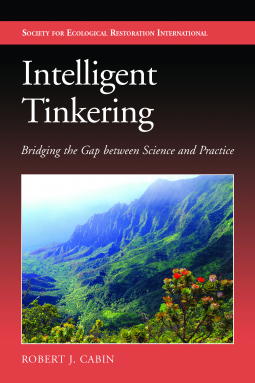
Intelligent Tinkering
Bridging the Gap between Science and Practice
by Robert J. Cabin
This title was previously available on NetGalley and is now archived.
Buy on Amazon
Buy on BN.com
Buy on Bookshop.org
*This page contains affiliate links, so we may earn a small commission when you make a purchase through links on our site at no additional cost to you.
Send NetGalley books directly to your Kindle or Kindle app
1
To read on a Kindle or Kindle app, please add kindle@netgalley.com as an approved email address to receive files in your Amazon account. Click here for step-by-step instructions.
2
Also find your Kindle email address within your Amazon account, and enter it here.
Pub Date Jul 20 2011 | Archive Date Mar 08 2022
Description
Robert J.
Cabin uses the restoration of tropical dry forestland in Hawaii as an
in-depth case study to investigate the scientific, practical, and
philosophical issues associated with performing ecological restoration
in the messy real world.
Interweaving entertaining narratives of his own on-the-ground experiences as a practicing restorationist with reflections about his scientific training and background, Cabin explores the relationship between science and practice in ecological restoration. He observes that because restoration can be complex and value-driven, its implementation often turns out to be as much interdisciplinary art as hard science.
Despite the often distinct cultures and methodologies of scientists and practitioners, Cabin shows how each has a vital role in effective restoration and offers suggestions for improving working relationships.
One approach he advocates is what he calls "intelligent tinkering," after the work of Aldo Leopold. In this model, practitioners employ the same kind of careful but informal trial-and-error strategy followed by such groups as indigenous peoples and hobbyist mechanics. Cabin illustrates the power of intelligent tinkering using examples from his own work and other restoration projects.
The gap between science and practice is not unique to ecological restoration; it is a widespread problem across all fields of applied science. Written in a clear and engaging style, Intelligent Tinkering offers an insightful look at the underlying causes of the problem, along with invaluable suggestions for addressing it. Robert J. Cabin is an associate professor of ecology and environmental science at Brevard College. Before returning to academia, he worked as a restoration ecologist for the U.S. Forest Service and the National Tropical Botanical Garden. "This book will set the tone for ecological restoration for years to come. It's not so much about Hawaii as it is about the imperative to resolve differences between the science of ecological restoration and its practice. It addresses ambiguities that we prefer to ignore regarding conservation. The book is a compelling personal account by Bob Cabin, who has serious credentials as a scientist and practitioner. Filled with imagery and insight, the book has the flair of a best-selling novel." --Andy Clewell, Society for Ecological Restoration
"Cabin offers rare, poetic insight into his experiences restoring Hawaii's dryland forest and the tension that exists between the science and the practice of ecological restoration. His plea for intelligent tinkering acknowledges that success requires good science but also good practice and local knowledge. This book will add spice to the debate about how best to do ecological restoration. No matter what perspective one has, everyone concerned about the fate of degraded ecosystems and the factors that drive restoration success should read this book." --Vicky M Temperton, Forschungszentrum Jülich
Interweaving entertaining narratives of his own on-the-ground experiences as a practicing restorationist with reflections about his scientific training and background, Cabin explores the relationship between science and practice in ecological restoration. He observes that because restoration can be complex and value-driven, its implementation often turns out to be as much interdisciplinary art as hard science.
Despite the often distinct cultures and methodologies of scientists and practitioners, Cabin shows how each has a vital role in effective restoration and offers suggestions for improving working relationships.
One approach he advocates is what he calls "intelligent tinkering," after the work of Aldo Leopold. In this model, practitioners employ the same kind of careful but informal trial-and-error strategy followed by such groups as indigenous peoples and hobbyist mechanics. Cabin illustrates the power of intelligent tinkering using examples from his own work and other restoration projects.
The gap between science and practice is not unique to ecological restoration; it is a widespread problem across all fields of applied science. Written in a clear and engaging style, Intelligent Tinkering offers an insightful look at the underlying causes of the problem, along with invaluable suggestions for addressing it. Robert J. Cabin is an associate professor of ecology and environmental science at Brevard College. Before returning to academia, he worked as a restoration ecologist for the U.S. Forest Service and the National Tropical Botanical Garden. "This book will set the tone for ecological restoration for years to come. It's not so much about Hawaii as it is about the imperative to resolve differences between the science of ecological restoration and its practice. It addresses ambiguities that we prefer to ignore regarding conservation. The book is a compelling personal account by Bob Cabin, who has serious credentials as a scientist and practitioner. Filled with imagery and insight, the book has the flair of a best-selling novel." --Andy Clewell, Society for Ecological Restoration
"Cabin offers rare, poetic insight into his experiences restoring Hawaii's dryland forest and the tension that exists between the science and the practice of ecological restoration. His plea for intelligent tinkering acknowledges that success requires good science but also good practice and local knowledge. This book will add spice to the debate about how best to do ecological restoration. No matter what perspective one has, everyone concerned about the fate of degraded ecosystems and the factors that drive restoration success should read this book." --Vicky M Temperton, Forschungszentrum Jülich
Available Editions
| EDITION | Paperback |
| ISBN | 9781597269643 |
| PRICE | $35.00 (USD) |
| PAGES | 272 |



